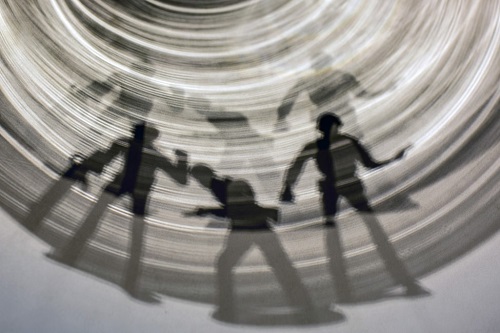Robert Couse-Baker photo
By
Zak Mucha
Fragile Men of Noir
Once the premise breaks open and the protagonist
is set upon I lose interest as the conflict follows deep
ruts and the outcome is the same as the one before.
As the path to clear his name, to save the girl,
and find the killer is delineated I change the channel,
lazily searching for the next offering from basic cable.
I only want to see the construction of events
leading him into the corner where ego-syntonic
PTSD is nursed into a sharp blade
to protect his property and
all that which defines him —
wife, child, job, Democracy.
One passenger framed the Air Marshall,
killed three people, poisoned the pilot,
and hid a bomb inside the suitcase of cocaine.
He’s stalking me, trying to make me look crazy.
The killer has pictures of cops’ children tacked to the
wall. The hero grows a trauma beard in his isolation
thinking of the child lost, the nice lady
he couldn’t save from an icy death, and the
cackling madman who is vaguely homosexual.
He’s Jesus with a drop piece taped to the small of
his back in case he has to fake a surrender,
a regular joe suffering so others do not.
The denouement of emergency crews sluicing into
the destruction, the media crush and begrudged
congratulations from the police chief as credits roll.
We sit in his neglected apartment, surrounded by blinking xmas lights
framing the windows and ornaments from his kids on the little tree.
With his aesthetic wounds healed he apologizes on TV in another
press conference: I don’t recall that ever happening but
if I’ve made anyone uncomfortable I apologize.
I’m not really like that. I remember the interaction
very differently.
Saint Al’s Italian Beef
The rec room wood paneling framing
the Stations of the Cross in cellophane
primary colors over basement windows
torture scenes of skinny Jesus, stripped to his
girded loins, run clockwise around the room and
lit by parking lot and rectory yard
The story held in a child’s red 3D Viewmaster
or a lightbox beer advertisement in Mama Vesuvio’s
where the water never stops splashing and where
my uncle became pals with the owner days
after moving to the neighborhood and accidentally
setting fire to his carry-out with a lit cigarette
The nuns and priests were interchangeable strangers,
to me, the obedient kid concocting absurd protests via
the Roulette Wheel of bad ideas, quiet for now
in case I was being watched. I could wait to
set fire to my own dinner and fall asleep
during a car chase on Lake Shore Drive.
In catechism, the nun passed out sheets of stickers
to decorate our folders as children did, but literal illustrations
of New Testament piety in detailed realism did not fit
the baby cultural capitalism of Ben Franklin
penny candies and Scratch-and-Sniff stickers.
One sheet of yellow smiley faces somehow got shuffled
into the deck of stickers passed down the row by the sister.
I took one crucifixion and one smiley face,
placing the latter atop the face of the former,
and burst out laughing. Years later
Jason would do deliveries with a pitcher of beer
between his knees and on Saturdays we would
pound the dents out of his car, in recognition and
in honor of that Roulette Wheel each of us had
behind one eye or the other one time or another.
We learned this from the adults already stuck.
My uncle could fold a whole sandwich into his mouth
and his bookie once ate fifty-two White Castles on a bet.
On their non-W-2 afternoon errands they whispered to the kid at the 7-11
they were going to buy the place, fire all these assholes,
and make him the manager. The girl who worked there
was a skinhead who later became a Chicago cop.
11 AM mass, Jason recited the Our Father in a monotone,
dull-eyed and flat faced for the Roulette Wheel. He also
knocked his own father to the kitchen floor once, bouncing
the house over the empty crawlspace.
We each left as soon as we could.
Jason drove that same car into the side of a viaduct in Colorado.
I got the phone call. Maybe it was a tree, but the guys said
they heard he didn’t touch the brakes at all.
He was a good driver, we assured ourselves
his suicide more comforting than any accident.
Zak Mucha
Zak Mucha, LCSW, is a psychotherapist in private practice and an analytic candidate at the Chicago Center for Psychoanalysis. Previously he supervised a community mental health program working with persons suffering severe psychosis, substance abuse issues, and homelessness. His most recent book is Emotional Abuse: A manual for self-defense.



No Comments Yet!
You can be first to comment this post!